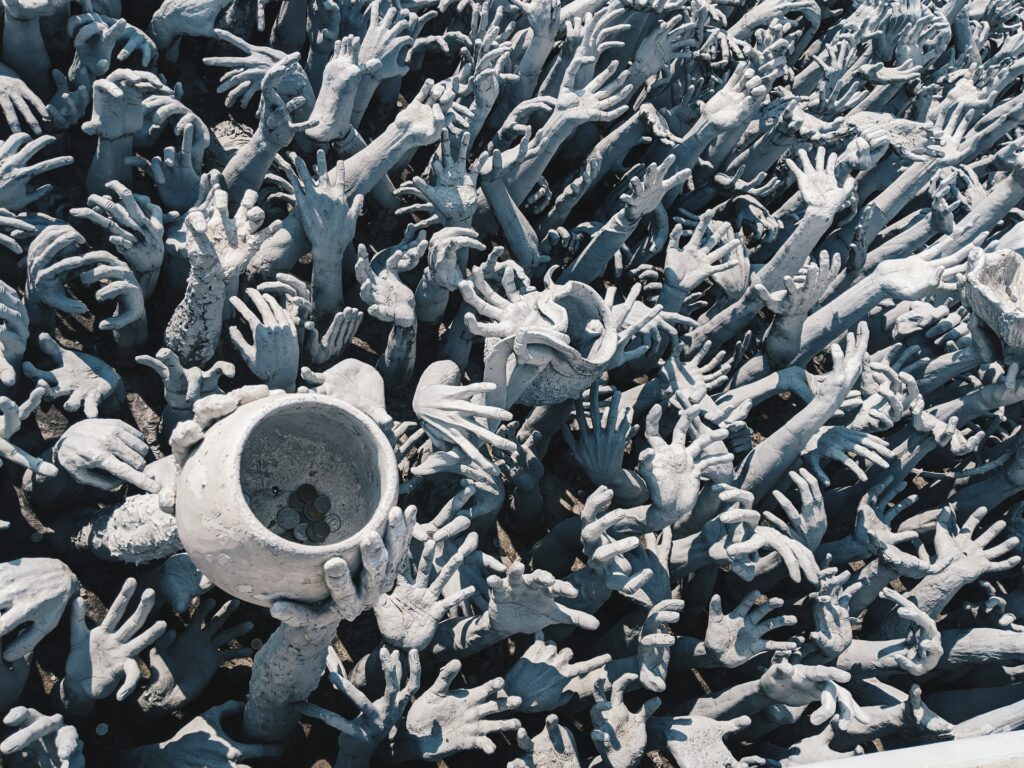When God declared His intention to put a successor on earth, the angels asked:
“How can You put someone there who will cause damage and bloodshed?”
Who has never asked him or herself this question!
It especially arises when we experience or witness some form of evil.
And what was Allah’s answer:
“Do you know the names of these things?”
Many times, I said to myself: How is that answers the question?
I knew there was some deeper meaning, but I’ve never stopped to look for it.
So in this article, I’ll try to uncover the teachings behind the most fundamental story of mankind—the story of Adam.
The Story of Adam

These verses on the story of Adam contains everything that makes the human life:
When your Lord told the angels, ‘I am putting a successor on earth,’ they said, ‘How can You put someone there who will cause damage and bloodshed, when we celebrate Your praise and proclaim Your holiness? but He said, I know things you do not.
He taught Adam all the names [of things], then He showed them to the angels and said, ‘Tell me the names of these if you truly think you can.’
They said, ‘May You be glorified! We have knowledge only of what You have taught us. You have the knowledge to decide.’
Then He said, ‘Adam, tell them the name of these.’ When he told them their names, God said, ‘Did I not tell you that I know what is hidden in the heavens and the earth, and that I know what you reveal and what you conceal?’
When We told the angels, ‘Bow down before Adam’, they all bowed. But not Iblis, who refused and was arrogant: he was disobedient.
We said, ‘Adam, live with your wife in this garden. Both of you eat freely there as you will, but do not go near this tree, or you will both become wrongdoers.’
But Satan made them slip, and removed them from the state they were in. We said, ‘Get out, all of you! You are each other’s enemy. On earth you will have a place to stay and livelihood for a time.’
Then Adam received some words from his Lord and He accepted his repentance: He is the Ever Relenting, the Most Merciful.
We said, ‘Get out all of you! But when guidance comes from Me, as it certainly will, there will be no fear for those who follow My guidance nor will they grieve. [Quran 2:30-38]
The Angels’ Question
Why put humans on earth while they are capable of tremendous wrongdoing?
In the end, the behaviors of this creature may backfire and cause a lot of trouble.
Many people for example reject God because of the existence of evil.
The angles clearly didn’t understand the purpose of human life.
Why not just put angels on earth?
They are better candidates for the role of successor.
They are glorifying God’s praises and proclaiming His holiness to perfection.
Equally good scenarios could be:
- Make humans submissive to His will.
- Leave them in Heaven where they won’t feel the distance from Him or feel free to do whatever they want.
Allah answered that He knows what they don’t.
From this first exchange, we learn that giving praise and reverence are not enough to be a successor on earth.
The First Ability
The essence of being a successor on earth is knowledge.
This is the first thing Allah highlighted.
Man is a learning creature.
He’s been taught and given the gift of language.
When Allah asked the angels to name things, they couldn’t.
They said it’s beyond their capabilities. It takes knowledge they didn’t have.
But for Adam, naming things was nothing. It was a trivial thing.
From the very first verses revealed, Allah emphasized knowledge:
“Read! In the name of your Lord who created: He created man from a clinging form. Read! Your Lord is Most Bountiful One who taught by the pen, who taught man what he did not know.” [Quran 96:1-5]
Without the gift of language, we won’t be able to learn the way we do.
When asking the question, the angels didn’t consider the intellect of man.
And it’s not the only thing they didn’t consider.
How Comes Humans Have a High Status?

Jalaluddin Rumi wrote:
“How could God’s Justice and Gentleness allow a rose to prostrate itself before a thorn?” [Mathnawi]
The bowing of the angels indicates the high status of human beings in the hierarchy of creation.
Allah mentioned this status in another place in the Quran:
“We have honored the children of Adam and carried them by land and by sea; We have provided good sustenance for them and favored them specially above many of those We have created.” [Quran 17:70]
Even though angels are perfect in their obedience to God, human beings are given a special status.
And the reason for that is choice.
We do by choice what the rest of the creation has no choice over.
In the eyes of God, a chosen act of obedience is worth more than a programmed one.
The angels could only see one side of the coin — the destructive potential of humankind.
They missed the other side — the conscious choice in striving to achieve virtue.
The End of Innocence and the Completion of Humanity

The greatest sin in human history is called a “slip”.
The reason we are all on earth is considered a minor mistake!
From the beginning, humans were made for earth, and the earth was made to welcome them.
The whole episode in Heaven was a preparation for the descent, not a punishment.
First, there was an intellectual preparation (learning the names).
Then, Allah gives humans the possibility to make their own choices.
The last stage was eating from the tree.
Before that, our parents didn’t reach their full humanity.
After it, they had a notion of right and wrong. They became moral creatures.
Their original innocence didn’t come from awareness but ignorance of the self.
With the injunction to not get near the tree and Satan’s help, their internal forces activated.
The tree in itself seems to have nothing special.
It was a means for our parents to awaken and for Iblis to officially become Satan.
Wrongdoing and the Importance of Revealed Knowledge

The Messenger of Allah (ﷺ) said:
“By the One in Whose Hand my soul is! If you do not commit sins, Allah would replace you with people who would commit sins and seek forgiveness from Allah; and Allah will certainly forgive them.” [Muslim]
Wrongdoing is part of the human experience. But the problem begins when we don’t benefit from the experience.
Instead of bringing us closer to God, it pulls us away from Him.
Over time, we lose the ability to distinguish between truth and illusion.
Our parents knew names (worldly knowledge) but were missing guidance (revealed knowledge).
One speaks to the mind; the other to the spirit.
Without revealed knowledge, one cannot remember or perceive properly.
On one hand, our parents forgot the warning of Allah.
On the other hand, they couldn’t see the dangers of their ego and Satan.
Revelation tackles these two points.
First, it keeps reminding us of our responsibilities. Second, it unveils the obstacles that stand between us and God.
We lost the original innocence but revelation gave us a new one: tawbah (repentance)
A Life of Suffering?

The Quran is unambiguous about it. We will struggle on earth:
“We have created man for toil and trial.” [Quran 90:4]
And it doesn’t matter if we are believers or not. Everyone will be tested:
“We test you all through the bad and the good, and to Us you will all return.” [Quran 21:35]
However, the believers can tap into the power of their faith to sustain them during hard times:
“We shall certainly test you with fear and hunger, and loss of property and lives, and crops. But [Prophet], give good news to those who are steadfast, those who say, when afflicted with a calamity, ‘We belong to God and to Him we shall return.'” [Quran 2:155]
But is there any wisdom behind suffering?
The earth is not only a place of struggle, it is also a place for our growth.
As Helen Keller said:
“Although the world is full of suffering, it is full also of the overcoming of it.”
Suffering benefits us.
The law of opposites applies to each one of us.
How can we appreciate health without sickness? How can we seek strength without tasting weakness?
We, humans, thrive on challenges. Our positive forces activate with the negative ones.
In the end, even Satan is helping awaken our potential.
But why do some people have tough trials?
This is something I can’t tell.
If even Moses (as) couldn’t understand Khidr’s actions (check Surah Al-Kahf), how can I understand the causes behind each event?
I believe there’s good in each challenge we’re going through, whether it is in this life, the next one, or both.
And that’s enough for me.
Final Thoughts on the Story of Adam

We can blame Allah for our trials and become like Satan.
Or we can take responsibility and become like Adam (as).
Even though both of them disobeyed Allah, one was sent down in humiliation; the other with honor.
The potential for good and bad is available to all of us.
When the angles asked their question, they saw only a tiny fraction of the human beings.
They didn’t consider their intellect, the power of making choices, and the growth they can attain through suffering.
Added to guidance, these three elements are key to developing a relationship with God.
Without them, we can’t appreciate His Divine attributes and live the good life.
Article published: February 13, 2022
Popular Articles
- 7 Lessons from Luqman that Will Make You Wise
- How to Enjoy Salat and Make it Meaningful
- Mongols Invasions: Some Forgotten Lessons to Today’s Muslims
- For or Against Vaccines? That’s Not Really the Question
- Are Muslims Meant to Be Sleep Deprived?
- Islamic Psychology: A Model Where Faith Has Its Place
- Muslims Judging Each Other: Why and How to Be Less Judgy
- The Value of Time
- 3 Tips to Unlock the Believer Mindset
- The Certainties of Muslims in Uncertain World
- Allah According to Allah: The Beauty Behind the Verse of Light
- How to Make People Change their Mind: Persuasion!
- 5 Powerful Duas from the Quran to Help You in Both Worlds


